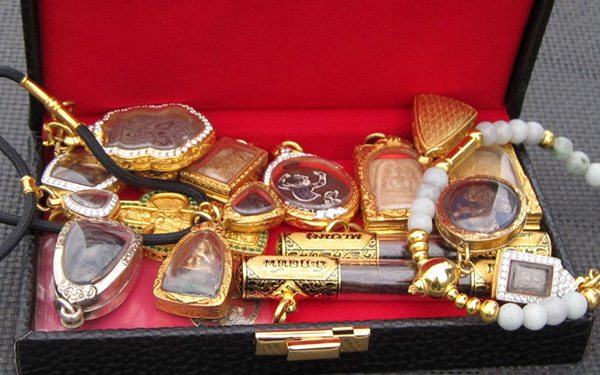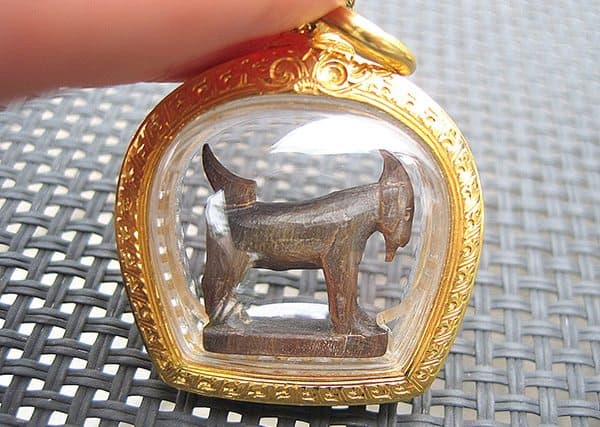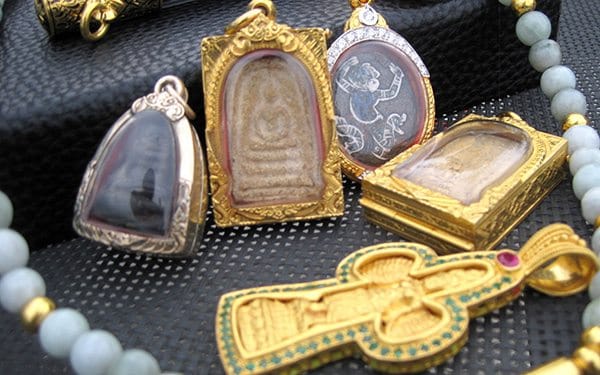A 33-year old petroleum engineer who also likes to trade stocks is not your typical amulets collector.
Well-built, fashionably dressed and possessing a brilliant smile that could very well be a celebrity’s, Jin is the proud (and possessive) owner of more than 60 traditional Thai amulets.
Indeed, Jin symbolizes the merging of both the ancient and the modern in fast-paced Bangkok.
One cloudy Bangkok afternoon, Jin agrees to talk about his ongoing obsession with these magical talismans. His chosen place for the interview, the rooftop pool of his very posh condominium, mirrors the apparent incongruence of the value of old traditions surrounded by contemporary trappings.
Unlike other collectors, Jin does not display his collection, but stores them carefully inside specially made, velvet-lined boxes which are kept inside a vault in his condo. He does not let visitors see the vault, nor his complete collection, because he is secretive about some of the amulets he has. However, he is quite eager and outspoken about his passion for collecting.

His amulets glint and shine under the Bangkok sun, but look surreal to be so exposed to the open air, especially on a rooftop deck next to a sleek infinity edge swimming pool. Some look positively ancient, their figures hardly recognizable due to the ravages of time. All are covered in gold, and some are adorned by glittering diamonds.
To Jin, though, there is nothing absurd about the whole situation. Surprisingly for this day and age, amulets still hold their mystical charm over many Thais.
Here, Jin reveals his ongoing obsession about these magical talismans.
What got you interested in amulets in the first place?
When I was around 10 years old, I got to read stories about how old monks had special powers. Those monks made special amulets, and, after they died, amulets depicting them were also made. I thought it was all so mysterious and cool.
Later I found out how expensive they are, especially the rare ones. After I made a lot of money on my own, I started buying those rare and special amulets to collect, trade and sell.
How many amulets do you have in your collection now and which ones are your favorites?
I have around 60 pieces. I only collect amulets that are at least 60 years old.
Two of my favorites are a handmade coin of Hanuman (a white monkey who helped Prince Rama on his quest to rescue his beloved wife Sita from the clutches of the evil giant king Ravana in the Ramayana epic) which is 100 years old, and a tiger figure carved into a tiger fang which was made during the reign of King Chulalongkorn (Rama V, 1873-1910).
There are so many amulets, how do you find them and how can you possibly choose which one to buy?
Age matters because back then it took a lot of time and effort to make just one amulet, but now a lot of them are simply mass-produced. Nowadays many monks just bless mass-produced amulets. I view them as not special at all. I also care a lot about the authenticity because genuine ones are super expensive.
For example, this one with the goat figure is for attracting females (because alpha male goats maintain a harem of females).

This is carved goat’s horn. But not just any goat’s horn; the horn must come from a goat that died being struck by lightning. And the carving must be done in just one direction. The requirements are very specific. So you see, this particular amulet is very, very rare.
I can confidently say that collecting amulets is actually better than collecting stocks because while stock prices can go up and down, the value of amulets can only go up.
How do you know which monks make legit amulets?
A monk must first prove he has magical powers. Once, I saw a monk demonstrate his power by piercing his own nose in front of devotees. No blood came out, and he simply wiped his nose with his own hand and healed himself.
Some monks specialize in magical tattoos, and when they tattoo people, these people will go into a trance and start acting like whatever the tattoo symbolizes. So if the tattoo is of a magical tiger (for protection), this person will start moving, growling like a tiger.
A few years ago, many Thais were so crazy about Jatukam Ramathep amulets, but those were just mass produced by some random monks to make money for their temples. After the trend died down, it was revealed that even the name itself was a complete nonsense. There is no mention of such a divine name in any holy ancient literature.
Can you talk us through a typical purchase?
I usually start by reading certain articles, or sometimes I hear about certain monks making certain amulets. Then I do a bit of research on the price. Finally, once I decide to buy, I just go to the amulets market or store to make the purchase.
Which amulets are popular nowadays?
Thais, Malaysians, Hong Kongers, Taiwanese and Indonesians are looking to buy Luang Puu Chuat amulets. He was a very famous and powerful monk who lived about 400 years ago. The prices for his amulets are increasing by 10 to 40 percent.
What is the most you’ve ever paid for one?
I paid ฿2.3 million (US$64,499) for a brass Luang Pho Nguen Wat Bangplarn amulet. It now has a market price of ฿5 million (a little over US$140,000).
Do you travel for them if you hear about something special?
Well, I fly to Chiang Mai five times a month to buy anything rare.
Why so often?
I have to go all the way there because if I am late, somebody else might grab it.
How much do you think your collection is worth?
I have spent a total of around ฿20 million (around US$560,995) for everything, but now they are worth 40 percent more in the market.
Do you display your collection?
No, I keep them inside special boxes at home. I only let professionals touch them as some of them are very old and fragile.
Do you wear or carry some of your amulets?
I wear five of them around my neck: Hanuman (white monkey), Ganesha (elephant-headed Hindu god of knowledge and remover of obstacles), Phra Pid Ta (one of Buddha’s disciples, portrayed with his eyes closed), Tagrood (a Sanskrit prayer written on a scroll), and Phra Somdet (powder which originated from a chalk Buddha image blessed by a powerful monk kept inside a container).
I always wear them under my clothes, though. I don’t want others to see my amulets hanging from my neck.
Why? I don’t know, I think I look old-fashioned like that!
Have any of these amulets ‘done’ anything for you?
They have given me money, protection and health. One time I was really sick, so I wore my Tagrood amulet and prayed to be relieved of the pain. Within one minute, I stopped feeling sick.
I am also so afraid of ghosts, just like the majority of Thais. Once I saw a man pop out of nowhere in my house. Then another time, a child’s ghost showed himself to me. I think the ghost was annoyed at me for having a fight with my Mom! But the experience unnerved me.
Another time, I took a picture of a new building, and I noticed there was a swollen, decomposing foot in the shot! The building’s owner freaked out when I showed her the picture, and she insisted that I erase it. Anyway, I believe that my amulets also protect me from bad ghosts.
So you’re superstitious.
Oh, I’m very superstitious.
I actually have two traditional Buddhist tattoos on my back – the figure of Vishnu (Hindu god of protection) and a Garuda (a mythical bird often appearing in Buddhist and Hindu myths). I also attend Astrology classes.
Can you cast spells?
Yes, I can cast spells for protection, safety and health.
Some people think that when you learn these things, you can do whatever you want, like cause misfortune to the people you hate, but I actually have to be very careful. Doing black magic against your enemies will just bring bad karma back to you.
One of my teachers made his enemy insane, but he later became blind. Whatever you do to another person, it will always come back to you.
— Jin’s phone suddenly rang. He politely picked up the call, and after exchanging pleasantries, he quoted a price – ฿200,000 (around US$5,607) – waited a while, then hung up. —
Sorry, that was somebody who was asking for the price of one of my amulets.
So people can just call you if they’re interested to buy some of your amulets?
Yes, and some call just for advice. Sometimes they’re not sure whether the amulet they want to buy is genuine or not.
But often, when I quote my price, they say nothing and just hang up!
Do you belong to any special club of like-minded people?
I used to, but not anymore. I found out that most of the people who belong to such groups are cheaters. They either sell fakes or try to convince you that your own amulets are fake so they can buy them from you cheaper. They work in teams. One will tell you yours is fake, then another will offer you a cheaper price for it.
Also, some Thais dislike people who sell Buddha images because they are supposed to be holy and sacred, not to be sold for profit… A lot of profit, in this case.
Have you been cheated?
Several times, at the beginning. I am self-taught, you see, so yes, it was tough the first time I started collecting amulets. It was quite difficult to tell the genuine ones from the fake ones.
Are your amulets insured?
Some of them are, the really rare ones. I have certificates of authenticity as well.
Will you ever sell your amulets?
Yes, if the price is right.
What will happen to your collection when you die?
If I have kids, I’ll pass my amulets to them. If not, I will donate them to a temple and let the temple auction them.

Which amulets do you have your eye on at the moment?
I am eyeing tiger fang amulets because most of them are legit and I know I can get them at 80 percent below the market price.
I tend to get lucky, you see. Once, I was just reading an amulets magazine at a food court. The food court worker saw me reading and offered to sell his amulet to me for ฿5,000 (US$140). I knew his was real, so I bought it. When I had it appraised, it was actually worth ฿50,000 (US$1,401).
I believe there are some people in the countryside who still hold on to their amulets as family heirlooms and are not looking to sell. I have seen cases where their children stole the family amulets and sold them, and then their parents would have to buy back the amulets from the buyer. Sometimes the police would get involved, too. This is how much Thai people care about amulets.
Why are Thais so obsessed with amulets?
There are many reasons. Some think amulets can give them money or good luck. Some wear them to be popular, so others around them will like them more. Others like collecting them, just like people who like collecting antiques. Still, others see it as a profession, because the market for amulets is profitable.
Thais claim to be Buddhists, but their Buddhism is actually not pure Buddhism. It’s more like a mixture of Buddhism, Hinduism and animism.
That’s why even though we respect the Lord Buddha, we also pray to Vishnu or Ganesh, and we believe in certain holy objects and relics. Life if often so unstable and uncertain, you know? So I guess we like to cover all bases!
Do you see yourself as unusual for your passion for amulets?
Not at all. Many Thais are as passionate as I am, though I don’t usually talk about my amulet collection with my friends.
I also don’t like to display my collection, and I don’t want people to know I have certain amulets. Yeah, you can say I’m secretive about my collection.
Lastly, what makes you happiest about your amulets?
They’re just so beautiful, you know? It’s not unusual for me to stay awake until 2 or 3 am just looking at them, touching and enjoying them.
They make me feel so satisfied and so happy.
All photography by Frances Suselo

